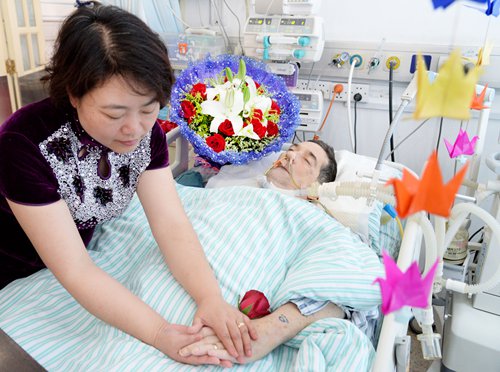
From the People’s Daily app.
This is Story in the Story.
Peter Hancock turned on the light in the bedroom of his son, Phillip Andrew Hancock. T here stood a guitar at the corner of the room. Unfortunately, there will be no music from its owner.
In a picture on the wall, Phillip is holding a panda with smile.
The 27-year-old Australian fell ill and died in the city of Chongqing on May 9. He donated his liver, kidneys and corneas, saving five Chinese lives and becoming the first foreign organ donor in the city.
He is one of the 10 foreign organ donors across the country so far, according to the China Organ Transplantation Development Foundation, which is responsible for approaching the relatives of potential donors and constructing a transparent and ethical organ distribution system. The 10 donors came from the US, Britain, Australia, Japan, Philippines, France and Greece.
Though China has one of the lowest rates of organ donation in the world, the number of donations has increased to 19,380 by September 9, with 54,956 organs donated, according to the official website of the China Organ Donation Administrative Center.
"The great behavior of foreign organ donors reflects the world's high recognition of China's organ donation and transplants," said Huang Jiefu, head of the China's National Human Organ Donation and Transplant Committee.
Today's Story in the Story will look at how foreign donors' trust and support reflects world's recognition of China's organ donation and transplants program.

Wang Hong holds the hand of her husband Mark Terence Osborne and says goodbye before the organ donation surgery at a local hopital in Hangzhou, East China's Zhejiang Province, on June 29, 2016. (Photo: VCG)
Phillip had lived in China for four years as an English teacher at Southwest University. He was interested in Chinese culture when he was in Australia and always hoped he could become a teacher in China, his parents said.
However, the young man fell ill from diabetes-related complications unexpectedly this May.
When the family flew to Chongqing, they saw him lying on the bed in the hospital living on life support.
"It's sort of hard to accept that when we were there, even though he was still breathing and still warm, he was gone," Peter Hancock said, while his wife Penny was tearing up. "It's hard to accept that he wasn't going to survive. And we had to ask the doctor many times, are they really sure."
After doing tests in different hospitals, doctors at the First Affiliated Hospital of Chongqing Medical University told the family evidence showed Phillip had lost brain function. Even if he was on life support, his organs would not have survived more than nine or 10 days.
"Phil always said if somehow he got into that situation, where he wasn't going to survive, he would like to donate his organs if he possibly could," the father said.
In order to respect the wishes of Phillip, the family decided to donate his organs to save others.
The father received a voice recording from one of the organ recipients in China with the help of the local Red Cross Society.
"He told us after the surgery was done, they were doing well…He was grateful for what happened. We just hope they are living a full life now," Peter Hancock said, adding that people should discuss organ donation with their family if they are unhealthy.
"If you can save somebody's life by donating, and if you know there is no hope for survival, then why not do it? Because it's pointless to take them with you," he added. "We've helped five Chinese people to live normal and healthy lives. I know Phil would be happy."
It was not easy for the majority of Chinese to quickly adopt organ donations, because a traditional belief that requires bodies to remain intact after death has a pervasive influence among them.
But Wang Hong's mother has gradually changed her attitude toward organ donation, after her British son-in-law, Mark Terence Osborne, donated his corneas, kidneys, heart and liver, and saved six Chinese people.
After over three months to process her husband's situation, on the day of their engagement anniversary in June 2016, Wang Hong decided to donate her husband's organs and signed papers in a hospital in Hangzhou, Zhejiang Province.
"I had strong support from my husband's daughter and brother in Britain. Mark's mother had lived another 20 years with the help of a heart donation," Wang said with tears in eyes. "The British believe they will get together in the heaven one day."
However, her 70-year-old mother found organ donation hard to accept at first. Her mother felt uncomfortable and full of regret because she thought her son-in-law was "incomplete" as he left this world, Wang said.
"But when she saw news about organ donors on television, she would say, 'My son-in-law did the same!' She must feel proud and comforted sometimes now," Wang added.
In 2017, 5,146 organ donations were made in China. Some 86 percent of the organs came from donations and the other 14 percent came from living relatives, the China Organ Transplantation Development Foundation said.
Liu Yu, a doctor specializing in organ transplants, did the surgery for China's first foreign organ donor, in Beijing, in 2014.
Tiana, a seven-month-old baby from the US, choked on a piece of plastic while playing at home on April 9, 2014. After attempting to rescue the child with great efforts, doctors failed.
Grieving over their daughter's death, Tiana's parents offered to donate her organs, in order to help other people.
Before the transplant, Liu went to buy a set of new clothes for Tiana in a shopping mall close to the hospital. "The child was staying in an intensive care unit and wore nothing. She should leave with dignity," Liu said, recalling his heavy mood during the afternoon of the surgery.
All machines were settled in the operating room. Before the surgery, doctors and nurses observed a moment of silence to show tribute to the little organ donor.
Tiana donated her liver, kidneys and corneas on that day and saved three Chinese children.
"What impressed me most was her eyes. She seemed to be asleep," Liu said. "Her mother hugged her and kissed her, trying to control her emotion."
In the same year, reforms of organ donation and transplants in China were taking place.
Huang Jiefu, head of the China's National Human Organ Donation and Transplant Committee, announced in December 2014 that from 2015, organ donations from common people would become the only legitimate source of organ transplants.
(Produced by Nancy Yan Xu, Terry Guanlin Li, Raymond Mendoza, Lance Crayon and Da Hang. Music by: bensound.com. Text from Global Times, China Daily, and Xinhua.)


